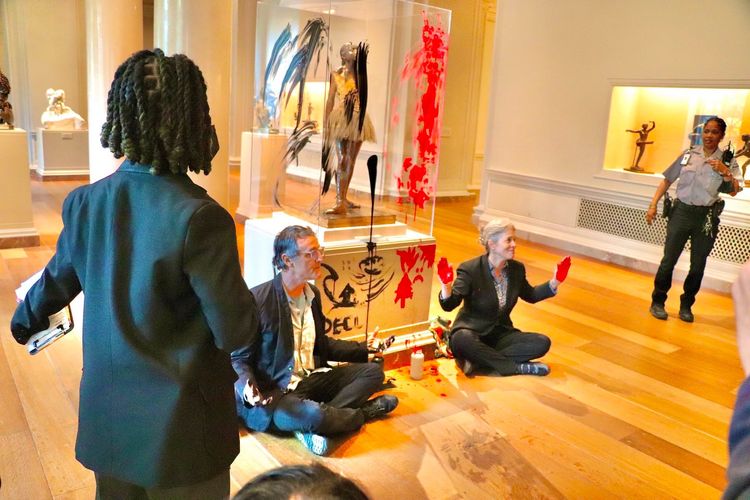It's Not Climate Denial, It's White Supremacy
It’s Not Climate Denial, It’s White Supremacy
By Mary Annaïse Heglar
Last week, Amy and I went on Pod Save America to play a special climate edition of a game called Take Appreciator. In the game, the producer reads us some of the worst climate opinions out there and we have to react. Y’all, the first one was Ben Shapiro out here making his trademark argument that sea level rise isn’t a problem because when the water comes, people will just move. (And no, it wasn’t the classic video with the blessed ax coming through the wall.) Something about hearing Ben’s fever-pitched voice took me back to 2019 when his minions swarmed my Twitter mentions, so my response was a little bit incoherent and there’s a lot I wish I’d said.
Here’s the part I got out on the episode: if you take this argument in good faith, it’s incredibly stupid, but it’s Ben Shapiro, so it’s an inherently bad faith argument. That’s what makes it so dangerous. Y’all, Ben is not stupid, he’s evil. He knows good and goddamn well everybody can’t move when the water comes—he just doesn’t care about the folks who don’t have the resources to move. Their lives do not matter to him.
I wish I’d clarified that the people who don’t have the resources to move are, by and large, people of color. And that the people who peddle in climate denial, or climate downplay, are almost never actual climate deniers. They “believe science,” they know what’s about to happen and, crucially, who it’s going to happen to: people of color, people of the global south, poor people. Climate denial was never about science and always about white supremacy.
Taken from a white supremacist lens, climate change could actually be seen as a boon because it gets rid of all those “undesirable” non-white people. It creates an almost legitimate rationale to close the borders: sorry, there’s limited resources, and we have to keep them for ourselves. We’ve seen this already. It’s called eco-fascism and I would say it’s the next logical step from climate denial except they’re both just different incarnations of white supremacy.
These folks aren’t stupid enough to think that they will be untouched by climate change; they just think it will be survivable. For them, a planet free of people of color is preferable to one with a stable climate. In other words, they hate Black and brown people more than they love their own children. It’s racism masquerading as stupidity and it was a mistake to ever laugh at it.
Nationalizing the U.S. Oil Industry Is Not As Radical As It Might Sound
By Amy Westervelt
In our latest podcast episode, The New Republic’s climate reporter Kate Aronoff joined us to talk about a topic that people really freak out about: nationalizing the oil companies. Kate walked us through what this could look like in the U.S.—a sensible, managed transition; one in which we could find a way to help Europe out and deal with high gas prices in the short term without locking in new fossil fuel infrastructure for decades to come, as the Biden Administration is currently doing. As Kate points out, what we’re seeing now is what happens when private companies are in the driver’s seat, making decisions that benefit their bottom line but don’t take the public into account at all. We also walked through the various other industries that are “nationalized” in the U.S., why it’s unlikely that the U.S. would become “just like Venezuela,” how we might avoid a nationalized U.S. industry operating along the lines of national Russian and Saudi oil companies, and more. If you’ve ever wanted to know more about what nationalizing oil companies really means, what it could look like, the pitfalls and benefits, all discussed in a rational way, this episode is for you. Check it out wherever you get your pods!
P.S. Holy hell you guys we cracked the Apple Top 100! That’s amazing, and a great proof point that people do in fact want to talk about climate. If you haven’t already, please help us out by dropping a rating or review on Apple. And THANK YOU so much for your support! We love you, Hot Cakes!
The Debate-Me Bros Leap to Elon’s Defense
By Amy Westervelt
A story by NBC News this week made an argument that techno-libertarian debate me bros have been making forever: Elon Musk is a climate hero and if you don’t agree then you’re more interested in progressive identity than moving the needle on climate.
Let’s unpack this a bit. For me, this argument boils down to three questions:
IS Musk a climate hero? Certainly, with Tesla, he helped to make electric cars cool. He also broke them out of the realm of hippies and biodiesel, attracting a new audience of billionaires, techies, and libertarians to the cause of electrification. Along the way, Musk has repeatedly been criticized for endangering and intimidating workers, and violating Clean Air Act and hazardous waste regulations. He has been vocally opposed to the idea of public transit (unless of course there’s some way to privatize and profit from it). He’s also started a space tourism company, the emissions from which could largely cancel out those saved by Teslas on the road replacing gas-fueled cars. To fuel those rockets, Musk plans to drill for gas near SpaceX’s Texas headquarters.
Are electric cars the ultimate climate solution? Electric cars are absolutely preferable to combustion engine vehicles from a climate perspective, and an important way to rapidly reduce emissions in the near-term. But long term, an even better climate solution is a move away from personal transit and fewer cars, period. Leaving billionaires like Musk in charge of the transition on transit means solutions that put the public’s interest over private profits are less likely.
Can we effectively solve for climate with a singular focus on energy sources? Folks like Matt Yglesias, or Breakthrough Institute co-founder Ted Nordhaus, make the argument repeatedly that in pushing for things like fair treatment of workers or looking at environmental decisions holistically—taking the impact of lithium mining into account when evaluating electrification, for example, or the impact of industrialized agriculture on water and soil and communities—the climate movement reveals itself as more focused on social change than the issue of climate. But for decades the climate movement focused solely on energy sources and it got…nowhere.
I’ve often made the argument that effectively solving the climate crisis requires rethinking power structures, not just energy sources. But when you are a wealthy dude who benefits from those structures, it’s easy to make the argument that changing them is a distraction. The debate-me bros also assume that those advocating for social change are opposed to incremental improvements in the meantime. I’ve never found that to be true; rather, progressives argue for keeping our eyes on the prize. So, if we take electric transport as an example, progressives aren’t opposed to electric cars so long as it’s clear that they’re a step along the path, not the final destination.
Too Hot to Handle
By Mary Annaïse Heglar
The temperatures in the Indian subcontinent (India, Pakistan, and Bangladesh) are up to 45 degrees Celsius (113 degrees Fahrenheit). For context, temperatures over 35 degrees Celsius (95 degrees Fahrenheit)—if there’s enough humidity—can be deadly. Also, quiet as it’s kept, heatwaves are the most deadly climate disasters. The temperatures in the subcontinent are so high that they’re surpassing the point where humans can be outside without overheating. They’re getting so high that your sweat won’t cool you. They’re getting so high that even if you have an endless supply of water, your life is on the line. And then there’s the fires.
But there are even more implications than that. Fans and air conditioners are straining the power grids, which is not that strong to begin with. We love to talk about how India is the third largest greenhouse gas emitter, but we never talk about how huge the population is, how dense the cities are, and how many people don’t have access to electricity at all. We don’t talk about how there isn’t enough potable water and precious little air conditioning, especially in the rural areas. And that’s across the subcontinent, not just India. As Dr. Aditi Mukherji, a water researcher and IPCC author put it: how do you “adapt” to temperatures like this? You can’t!
In March 2016, I got to visit India. It was one of the most beautiful places I’ve ever seen in my life. Everything was fascinating and ancient and sacred. But that doesn’t mean it was glamorous. The air pollution was just as breathtaking as the temples—and I do not have asthma. I still lose sleep over the inequality. Those are the people I worry the most about now: the people who live in makeshift homes with no running water, no electricity, and tin roofs that can bake a person.
While I was there, several times I got so hot that I had to lay down, and it wasn’t even dangerously hot yet—I just wasn’t accustomed. The heat I experienced was considered normal and, from most people I talked to, it was a point of pride to be able to bear it. If you can’t take the heat, basically, get your ass out of India. It was part of the reason the colonizers weren’t able to stick around.
If you know anything about India or Pakistan or Bangladesh, you know it’s hot, so it can be easy to dismiss this heatwave as “normal.” But, this heat is different. This isn’t just regular heat—even for places so close to the equator—this is climate change.
Digest
Your weekly roundup of climate coverage, from Georgia Wright and Jules Bradley.
Rising Temperatures, Rising Tides
Where forests disappeared last year, in one chart, by Benji Jones for Vox
India's Heat Wave Is a Grim Warning for Deadly 'Wet Bulb' Temperatures, by Audrey Carleton for Vice
Warning on Mass Extinction of Sea Life: ‘An Oh My God Moment,’ by Catrin Einhorn for The New York Times
Climate Change Will Accelerate Viral Spillovers, Study Finds - The New York Times, by Carl Zimmer
We Have Two Paths to Avoid the Worst of Climate Change - The Atlantic, by Robinson Meyer
We'll Likely Deal With More Pandemics as Earth Heats Up, by Molly Taft for Earther
'Extremely Critical Fire Weather' Threatens the Southwest - The New York Times, by Michael Levenson
The Next 'Great Dying' Is Coming for Your Seafood, by Angely Mercado for Earther
Why Americans Became More Vulnerable to Oil Price Spikes, by Hiroko Tabuchi and Maggie Astor for The New York Times
The Extreme Heat Pummeling India and Pakistan Is About to Get Worse, by Hari Kumar and Mike Ives for The New York Times
Lawns to Go Dry: Historic Water Restrictions Come to Los Angeles, by Lauren Leffer for Earther
'Eco-Anxiety' Might Be the Best Reaction for Saving the Planet, by Sophie Kazis and Sam Greenspan for Vice
20 Percent of Reptiles Risk Extinction, From King Cobras to Geckos - The New York Times, by Catrin Einhorn
City Living, With Less Water - The New York Times, by Somini Sengupti
India Swelters Under Heatwave, With Temperatures Set to Hit 118 Degrees, by Kevin Hurler for Earther
Two Fires Have Joined Forces in New Mexico as Southwest Wildfires Continue to Blaze, by Kevin Hurler for Earther
Deforestation Remains High, Despite COP 26 Pledges - The New York Times, by Henry Fountain
Amid the worst drought in a generation, we must step up aid in the Horn of Africa, by Janez Lenarcic and Jutta Urpilainen for The New Humanitarian
It's raining harder than ever. New research says climate change is to blame by Joseph Winter for Grist
'Relentless' destruction of rainforest continuing despite Cop26 pledge | Deforestation | The Guardian by Patrick Greenfield for the Guardian
The Climate Presidency?
Climate action in the Biden administration depends on EPA - Vox, by Rebecca Leber
Solar Industry ‘Frozen’ as Biden Administration Investigates China, by David Gelles for The New York Times
Vice President Kamala Harris Promised Me a Fracking Ban | Atmos, by Jessie Bluedorn
How Biden Can Stop Louis DeJoy's Gas-Guzzling USPS Plan | The New Republic, by Mekedas Belayneh
States Sue Postal Service Over New Gas-Powered Mail Trucks - The New York Times, by Coral Davenport
Climate Accountability
Chevron and Exxon Report Huge Profits Amid Sky-High Gas Prices, by Lauren Leffer for Earther
Russia's invasion of Ukraine is fracturing the delicate peace in the Arctic, by Umair Irfan for Vox
Warren Buffett Faces Renewed Climate Change Challenge by Investors - The New York Times, by Peter Eavis
Bank of America, Citigroup, and Wells Fargo Vote to Keep Financing Fossil Fuels, by Kate Aronoff for The New Republic
The Kochs' Dream of Smashing Climate Action May Be About to Come True, by Greg Walters for Vice
The long-shot campaign to get big banks out of fossil fuels, by Rebecca Leber for Vox
Justice Is Justice Is Justice
Fed-Up Puerto Rican Businesses Sue Power Company After Yet Another Blackout, by Angely Mercado for Earther
Terrestrial Indigeneity | Atmos, by Ruth H. Hopkins
Indigenous women call for financial institutions to stop investing in extraction by Carina Dominguez for Grist
FPIC is essential to Indigenous rights, so why isn't it followed? by Joseph Lee for Grist
Coalition climate policy forced big polluters to pay $15m for carbon credits in past year by Adam Morton and Katharine Murphy for the Guardian
Glimmers of Hope
New legislation to spur UK’s switch to low-carbon economy by Jim Pickard, George Parker, and Nathalie Thomas for Financial Times
Say Goodbye to Incandescent Light Bulbs, by Kevin Hurler for Earther
UN Building a Global Early Warning System for Extreme Weather, by Angely Mercado for Earther
Climate in Culture
Climate Activist Who Self-Immolated in Front of Supreme Court Dies, by Audrey Carleton for Vice
Dairy Giant Decries Vegan 'Cancel Culture,' Says Gen Z Is 'Ashamed to Order Dairy in Public' by Molly Taft for Earther
Is it ethical to have kids in the climate crisis? By Brian Bethune for Macleans
Finally, Climate Change Has Become An Election Talking Point. Here's What the Parties Are Promising, by John Buckley (AU)
60 Seconds on Earth with Bonnie Wright | Atmos, by Hannah Rose Méndez
The Thorny Ethics of Historic Preservation in the Age of Climate Change, by Eleanor Cummins for The New Republic
Can Art Help Save the Insect World? - The New York Times, by Alix Strauss
This Eminent Scientist Says Climate Activists Need to Get Real - The New York Times, by David Marchese
Hotels With Sustainability and Net-Zero Ambitions - The New York Times, by Elaine Glusac
Plus More
Remains of Ancient Giant Sea Creatures Found In Swiss Alps, by Becky Ferriera for Vice
The Climate Movement in Its Own Way | The Nation, by Charles Komanoff
A Day in the Life | Atmos, by Willow Defebaugh
Beyond the Human | Atmos, by So and Pinar Sinopoulos-Lloyd
Climate Queries, Asked and Answered - The New York Times, by Somini Sengupta





Only paid subscribers can comment.
Please subscribe or sign in to join the conversation.